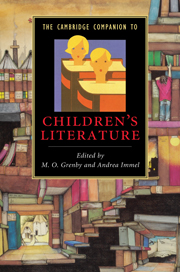11 - Ideas of difference in children’s literature
from Part II - Audiences
Published online by Cambridge University Press: 28 November 2010
Summary
The rather obvious observation that children are 'different' - from adults, from each other - stands as the point of departure for this chapter on the foundational nature of discourses of difference in the development of 300 years of Anglo-American children's literature. Simply put, without a powerful guiding belief in essential differences between adult and child, there would be no 'children's literature'. Awareness of 'differences', or acknowledgement of the presence of 'others', has been noted and explored in children's literature from its earliest inception: consider one of the tales from John Aikin and Anna Laetitia Barbauld's widely read Evenings At Home (1792-6), 'Travellers' Wonders'. In this tale about cultural perspectives, Captain Compass' children - whose imaginations have been stirred by the marvellous sights and people described in Gulliver's Travels and stories about Sinbad the sailor - implore him to recount adventures from his own voyages. The fond father replies with a long description of a remarkable people whose habitations, clothes, diet and customs all appear to be perfectly strange to the children - for example the inhabitants fill their mouths with noxious smoke, uncover their heads as a salutation, and spread a delicious grease upon virtually all of their food - until one of them realises with a start that their father has been describing Britain all along.
- Type
- Chapter
- Information
- The Cambridge Companion to Children's Literature , pp. 174 - 190Publisher: Cambridge University PressPrint publication year: 2009
- 3
- Cited by

